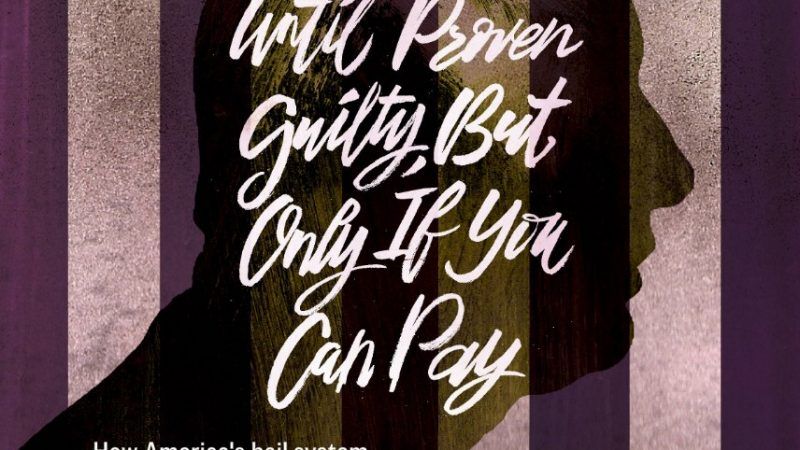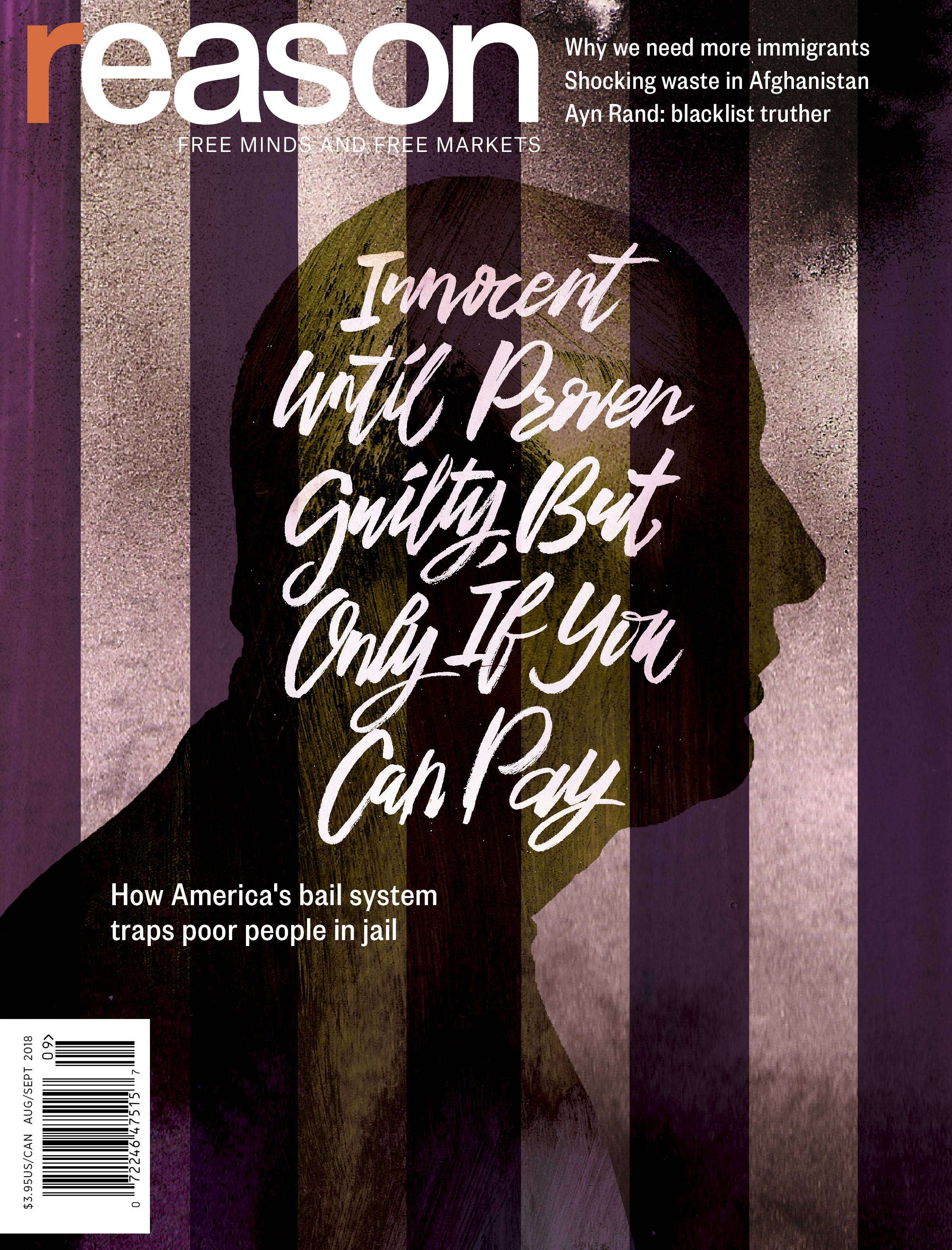Americans Support Alternatives to Cash Bail, Once They Know They Exist
People don't like the idea of people who haven't been convicted yet being stuck in jail because they can't pay


Once they know about the pretrial criminal justice system, many Americans supporting reforming it. Unfortunately, many Americans know practically nothing about the pretrial criminal justice system.
Those are the two big conclusions we can draw from the results of a poll released today by the Pretrial Justice Institute (PJI) and the Charles Koch Institute (CKI), which jointly commissioned the survey.
For the 41 percent of you who have never heard of, or have no opinion of, the term "pretrial justice," that's a catch-all term for the court systems that manage people who have been charged with crimes but not yet convicted. Paul Manafort, for example, is currently a guest of our federal pretrial justice system. More than half a million more people are being held in some form of pretrial detention. That's a substantial chunk of the 2.3 million people incarcerated in the U.S.
The intent of the PJI/CKI poll was to see how Americans feel about potential reforms that would make more people free prior to the conclusion of their cases. The numbers are encouraging. A whopping 78 percent of Americans believe that the current system of pretrial justice heavily favors the wealthy. That's partly due to our reliance on cash bail schedules to determine who gets to be free while awaiting trial and who remains behind bars until the court gets to them. Those who can front the money for bail or afford to pay a bail bond company are able to go free. Those who are poorer and thus unable to pay for bail remain behind bars solely for that reason.
When asked about money, 57 percent of respondents said they don't want to keep people behind bars if they can't afford bail except in extreme cases. A plurality of 45 percent said they'd like to see money bail replaced with pretrial assessment and monitoring systems. And 72 percent said that "public safety" should be the primary concern when deciding whether somebody should be detained prior to trial.
Defendants who have been merely charged with a crime are supposed to be treated as though they're innocent until they are proven guilty, but is that how Americans think they should be treated? The answer seems to be yes. When asked whether prosecutors should have to petition for pretrial detention, or whether defendants should have to petition for their freedom, 52 percent of respondents said that prosecutors should have to argue for detention; only 27 percent did not believe that freedom should be presumptive. That's frighteningly high, but not terribly surprising.
"The bottom line is, the public believes the government must prove an individual belongs in jail before trial—which is the opposite of how the system works now due to the widespread use of money bail," responded Pretrial Justice Institute CEO Cherise Fanno Burdeen in a prepared statement.
Those polled strongly approved a number of pretrial support mechanisms—like education and counseling, transportation, and court reminders—for defendants who need them. The vast majority would like to see support services for defendants who are victims of domestic violence, have mental health issues, or are addicted to drugs or alcohol.
The most relevant take-away for pretrial justice reformers is that educating the public about pretrial justice issues may be key to fixing them. As they were introduced to alternatives, a good 28 percent of respondents who were opposed to, or undecided about, moving away from money bail came around to the idea. Turns out, people aren't opposed to more sensible criminal justice policies, they just don't know they exist.
Read more about the poll results here. Efforts to reform how pretrial justice systems work are the focus of Reason magazine's August/September cover story, on the stands now. Check it out.
Editor's Note: As of February 29, 2024, commenting privileges on reason.com posts are limited to Reason Plus subscribers. Past commenters are grandfathered in for a temporary period. Subscribe here to preserve your ability to comment. Your Reason Plus subscription also gives you an ad-free version of reason.com, along with full access to the digital edition and archives of Reason magazine. We request that comments be civil and on-topic. We do not moderate or assume any responsibility for comments, which are owned by the readers who post them. Comments do not represent the views of reason.com or Reason Foundation. We reserve the right to delete any comment and ban commenters for any reason at any time. Comments may only be edited within 5 minutes of posting. Report abuses.
Please to post comments


Charles Koch Institute
Dismisses survey results.
Amendment VIII: Excessive bail shall not be required, nor excessive fines imposed, nor cruel and unusual punishments inflicted.
Everyone is entitled to non-excessive bail. Murder suspects, flight risks, and any other person charged with a crime. If they miss a court date then set the bail higher but cash bail should be like $5 for misdemeanors and $10 for felonies.
Goddamnit, Shackford.
Maybe I misread, but it seems the survey dodged the issue a bit:
And 72 percent said that "public safety" should be the primary concern when deciding whether somebody should be detained prior to trial.
...
When asked whether prosecutors should have to petition for pretrial detention, or whether defendants should have to petition for their freedom, 52 percent of respondents said that prosecutors should have to argue for detention; only 27 percent did not believe that freedom should be presumptive. That's frighteningly high, but not terribly surprising.
I'm betting the "Allow the presumed innocent to go free at increased risk to public safety." is well lower than 52%; "Prosecutors should have to argue in favor of your detention unless your alleged crimes are dangerous (enough), then jail is presumptive."
Three things:
1. Technically don't prosecutors already do that? Isn't that what an arraignment hearing is? I'm not saying the system works as it should, but typically the prosecutor asks for some form of bail, right?
2. Agree with your assessment about how the results would change with a slight rewording.
3. Why would "public safety" be the overriding concern? Public safety makes the assumption the person is guilty. The purpose of bail/pre-trial incarceration should be to ensure someone shows up for trial.
Keeping people in jail ups the state's odds at getting a plea or guilty verdict.
In jail, you cannot work to pay for a better attorney and research your case yourself.
In jail, you can be hurt or killed before you even get a trial.
In jail, most people want out as fast as possible which leads to more plea agreements.
I prefer your way of laying out all the points more cogently.
Once they know about the pretrial criminal justice system, many Americans supporting reforming it.
If only Comrade Stalin knew!
No, many Americans are willfully ignorant about how the "justice" system works because then they might feel compelled to feel guilty about it. Much better just to assume the cops - with the rare exception of one or two bad apples - are brave heroes bringing justice to the mean streets and if the system doesn't work quite the way it's supposed to, well, we all know the cops aren't out there arresting innocent people. If they cut a few corners bringing the bad guys to justice, it's more important that the bad guys pay for their crimes than that the rules be strictly followed, the bad guys all get these lawyers that get them off scot-free on a technicality anyway, don't they? If you've done nothing wrong you have nothing to fear, therefore if the cops are arresting you it's obvious you've done something wrong. So why get your knickers in a twist over how criminals are treated? They're criminals, don't be so soft-hearted or soft-headed about their treatment.
My pretrial justice system is run by Smith & Wesson.
Check out Charles Bronson over here.
The difference being that Paul buys his mustache on Amazon.
I have apps that auto-paste it on my selfie.
But like a self-driving car, the tech sometimes puts them in places I never intend them to go.
So who pays for these "support mechanisms"?
What kind of absolution do I get for a pound of homegrown?
How about an example of why Americans can feel safer as a result of cash bail?:
"Stormy Daniels Out On $6,000 Bail Before Friday Arraignment | Velshi & Ruhle | MSNBC"
https://www.youtube.com/
watch?v=ibxJDBNJh9Y
Now, if she had been allowed to walk, who knows how many other undercover cops might have touched her by now, the detriment of civilization?!